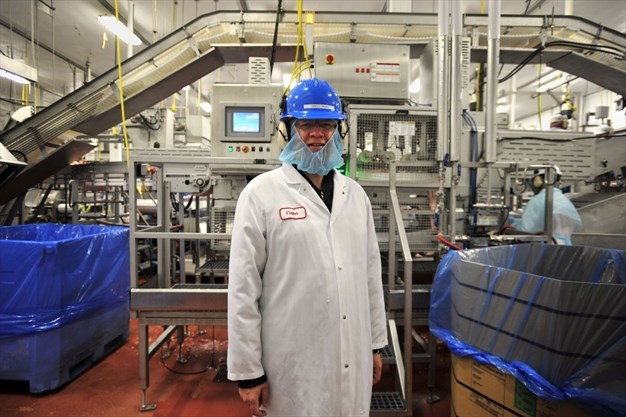
Arnold Drung, president of Conestoga Meat Packers, says “it would have been an absolute disaster for us” if Canada hadn’t signed onto the Trans-Pacific trade deal. – Record file photo
KITCHENER — News that Canada will sign on to a revised Trans-Pacific trade deal is music to Arnold Drung’s ears.
“That’s phenomenal for our industry,” the president and chief executive officer of Conestoga Meat Packers told an audience at a Greater Kitchener Waterloo Chamber of Commerce luncheon Tuesday.
“It would have been an absolute disaster for us” had the agreement not come about, he said.
The deal involving Canada and 10 Pacific Rim countries, now called the Comprehensive and Progressive Agreement for Trans-Pacific Partnership, builds upon the initial agreement that the United States withdrew from one year ago.
The Breslau-based pork producer, which employs more than 900 people, exports to more than 25 countries. Japan, one of the agreement’s signatories, is a key market for the company, with about five shipping containers a week bound for the Asian nation. Drung said Japan is Canada’s highest-value pork export market.
“For us, market access is key,” Drung said. “We want to make sure the playing field is level.”
China — which is not part of the trade agreement — is an even larger customer for Conestoga, receiving about 10 containers, or 200,000 kilograms of pork, a week. What’s more, a lot of the pork products that Conestoga ships to China are things most Canadians wouldn’t consume.
Drung’s comments came during a discussion about modernization in the food sector, something that has transformed food safety and traceability, expanded markets and changed the way his employees do their jobs, he said.
For Kevin Martin, president of St. Jacob’s area apple producer Martin’s Family Fruit Farm, technology has diversified his products and turned his business into a year-round operation.
Established technology that sees picked apples stored in a controlled atmosphere — essentially a sealed room with its oxygen removed — basically stops the ripening process in its tracks. More recently, the company took existing drying technology and came up with a snack product, Crispy Apple Chips.
A huge variable that’s out of their control is the weather, and the irregularity of growing seasons, Martin said. “We spend a lot of energy and technology on risk mitigation to offset that.”
Looking to the future, Martin said he’s beginning to think that he could see the introduction of automation to the apple harvest within his lifetime; the hand-picked harvest is one element of the business that hasn’t changed much over time.
Drung said there’s room for improvement when it comes to regulations and the ability to quickly adopt new technologies. It can be a slow process, he said — problematic in a highly-competitive global marketplace.
“Probably the biggest threat to us would be complacency,” Drung said. “We could be outflanked very quickly.”
bdavis@therecord.com , Twitter: @DavisRecord
This article was written by Brent Davis for the Waterloo Region Record. Read the original article here.